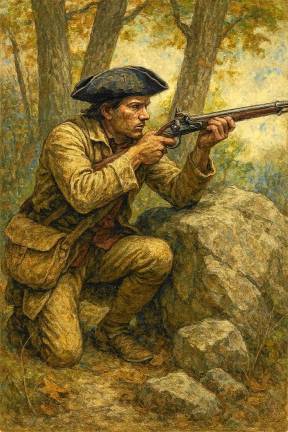
As we leave summer and begin fall, it is the countdown to the 250th anniversary of the Declaration of Independence on July 4, 2026.
As such, we will be recognizing people of the Revolutionary War period in this history column.
First up is a person who has come to my attention as I researched my forthcoming book (due to be released in November) about the Battle of Minisink and the Seward family. The book is titled “Mohawk on the Delaware,” and some of the interpretation below is from my writing for the book. The person in question is Moses DeWitt.
Some background: The British mostly stayed in the safe haven of New York City. In 1779, the Indian raids and killings of American settlers in eastern Pennsylvania were getting to be too much for Gen. George Washington. He had Maj. Gen. John Sullivan cross the Delaware River with 4,500 Continental soldiers that June. They camped in the Van Campen Inn area, then crossed at Easton, Pa., to begin the campaign through Pennsylvania and upstate New York. This sweep lasted until October.
In July, Capt. Joseph Brant, a Mohawk chief and Dartmouth College graduate, came down from the north with several Indian tribe groups and Loyalists known as Butler’s Rangers.
They ravaged the area near today’s Port Jervis, killing and burning, taking prisoners and livestock, and retreating northward on the eastern bank of the Delaware.
Word went out. An alarm rider, our own county’s Sgt. Thomas Talmadge, who was stationed nearby, took the grim and urgent news southward to alert the militia.
As Col. John Seward of Snufftown gathered the men near today’s Hamburg, some went first went through Deckertown and moved through the Clove. There were the Talmage brothers, Ensign Middaugh, Ross, Patton, Wade. They also picked up men from Deckertown, who were Owens, Ferguson and Williams, and the Shepherds from the town. From the Clove, they picked up DeWitt and Mead, then Reed and Myers near the New York border (who had tales of vanquishing the Indians easily, which was not a good foreboding).
A story for another day is about the leader Maj. Samuel Meeker and under his command Capt. Joseph Harker. They took the group up the old Indian Path along the river. Even though the British had a sizeable head start, they were slowed with the livestock and prisoners. They hoped to get to Minisink Crossing, move into the woods, and go north and west beyond danger.
The mixed militia of New York and New Jersey men - our Second Militia of Sussex County - did reach them, under the command of Col. John Hathorn of Warwick, N.Y. The battle ensued, again a story for another day and fully described in my book.
Now, here is the warrior tale of DeWitt, a hero in my estimation. We are deep into the battle at this point.
A man near the top of Ambush Hill fell to an Iroquois tomahawk, screaming as he fell, “Moses, help me!” to DeWitt, who was beside him as he died. DeWitt took up his fallen partner’s musket and fired on the Indian and so killed him.
DeWitt grabbed for the discharged musket, loaded it and used it with deadly effectiveness on two other enemy braves as they rushed onward into the line of militia.
Reconstructing the battle and the outcome, the following probably took place this way.
DeWitt, then 33, was exposed. The militia were not dug in and only had some small boulders or emerging rocks, so all were very vulnerable to the enemy. DeWitt was under fire from those of the enemy soldiers with balls flying like hail in his direction.
He was chased by the Indians, who were firing at him, and he had come to a ravine, possibly Dry Brook, as he evaded the musket shots. The Indians lost chase.
Coming down to the bottom of the mountain and along the riverbank flats, he spotted two of his comrades. One couldn’t walk. He used his canvas jacket to bind the man’s lacerated feet. They looked for and found a horse to take the cripple to safety where he survived.
This information was compiled from several historic documents and accounts. A total of 46 Patriot militiamen, Yorkers and Sussex County militia, died in the battle. The site was not visited until the 1820s.
Today, there’s a DeWitt Road in Wantage near where he lived.
Let’s honor those true Patriots, and let’s honor Moses DeWitt.
Bill Truran, Sussex County’s historian, may be contacted at billt1425@gmail.com He is the author of “Mining for America: The Franklin-Sterling Hill, N.J. Zinc Mines.”